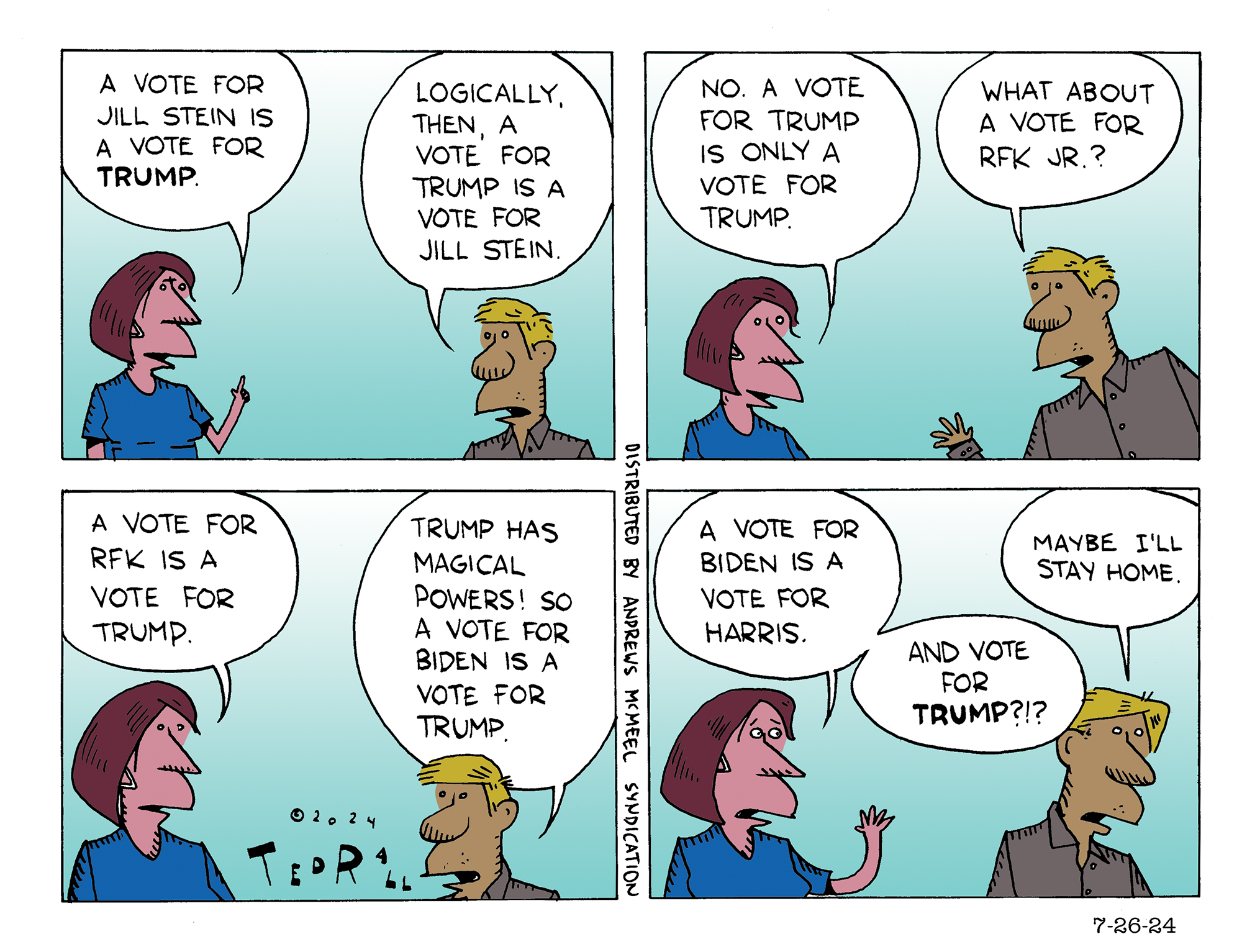Not only is strategic voting bad for your soul, it doesn’t really make a lot of sense politically. Why not just vote for whoever you want to see win?
A Vote for Jill Stein is a Vote for Trump

Ted Rall
Ted Rall is a syndicated political cartoonist for Andrews McMeel Syndication and WhoWhatWhy.org and Counterpoint. He is a contributor to Centerclip and co-host of "The TMI Show" talk show. He is a graphic novelist and author of many books of art and prose, and an occasional war correspondent. He is, recently, the author of the graphic novel "2024: Revisited."

7 Comments. Leave new
Sorry, staying home is ALSO a vote for His Hairness!!!
It’s called tedsidealism.
A clip from Mama Cass and John Denver talking about voter registration back in August 1972 with the same kooky idea as Ted: you vote for who you believe in.
Between Trump and Harris? What’s the difference? Really. Harris’ speeches so far have all been the same sort of booster nonsense as Trump, Biden, and Hillary Clinton. The media is marketing Harris as Gen X in order to make her more appealing to Gen Z, but she is barely Gen X, being born in 1964, the cusp year between Boomer and Gen X. And her speeches do not emit even a quark of Xer sensibility or fed-upedness. It always sounds carefully manufactured and processed, just like Boomer Hillary Clinton.
Until we get ranked-choice voting in general elections, there is strategic value in choosing one of the top two contenders. You can vote for one of them or you can do something different (stay home, vote third party). Mathematically, the second approach expresses no preference among the top two, so if you have a preference for one of the two over the other then the second approach is not your optimal strategy.
We desperately need ranked-choice voting for general elections! Advocate for it everywhere you can.
Kenneth Arrow got the Nobel Prize for proving Arrow’s Impossibility Theorem: there is no fair, logically consistent way to vote for a choice among more than two candidates.
You have two candidates who want to make the Ukraine part of NATO, something Russia says means total war, but those two both have more than 1/3 of all the voters willing to vote for them, so voting for anyone else is a wasted vote, and voting for either of the top two means WWIII. Ain’t no good choices, no way, no where, no how.
Arrow’s Impossibility Theorem is explained in the wiki article at: https://tinyurl.com/4czmjzxa
While the theorem applies to RANK-order voting in elections with more than 2 candidates, it does NOT affect
RATE-ordered voting, for example, which definition can be gleaned from the article. So the US winner-take-all system
is not the only voting system adhering to the Arrow theorem.
I don’t have the 3-5 extra lives that would be needed to fully understand the set theory definitions and manipulations
behind the theorem. But since it was developed in the 1950’s, I would doubt that the theorem actually took into account the factors that contribute to the chronically and abusively non-democratic system with which we are now saddled:
1) corporations are people 2) money is speech 3) uni-party whose two standard candidates differ on in their proper names and not on policy 4) corporate controlled media 5) court rulings (e.g., Sanders 2016 case against DNC re manipulation of primaries) that codify the notion that political parties are private entities that are entitled to any anti-democratic, authoritarian activities that they deem necessary in their operations 6) private campaign donations allowed.
7) 50% of eligible voters don’t vote precisely because of 1-6, above 8) ETC …
Hehe. This logic indeed gets convoluted.
Technically failing to cast a vote for Harris/lesser evil is at best casting 1/2 vote for Trump/greater evil.
To offset failure to vote Harris, it only needs one person to cast their vote for her to make up for this particular moral shortcoming. Whereas actually voting for GE/Trump needs 2 people to offset: the 1st for equalizing his vote share, the 2nd for getting ahead again.